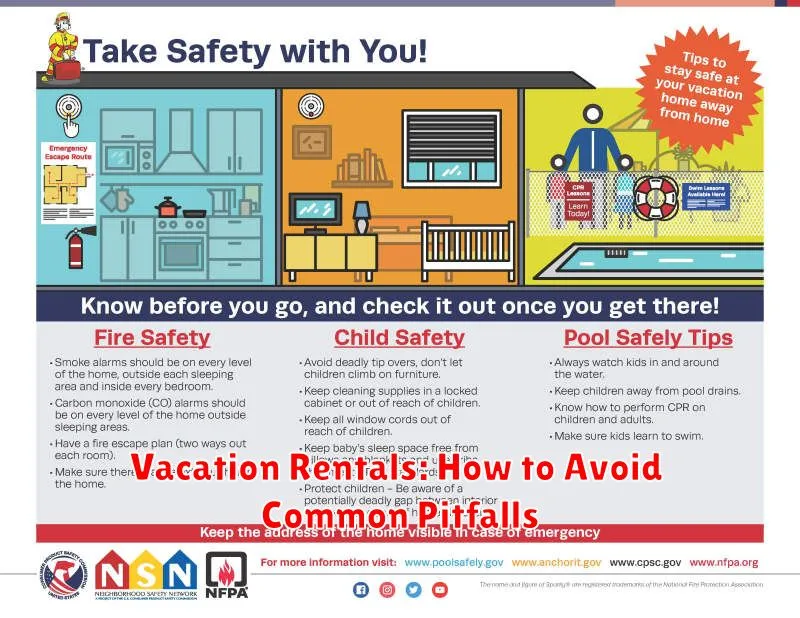Planning a dream vacation? Securing the perfect vacation rental is crucial for a memorable and relaxing experience. However, the process of finding and booking a vacation rental can be fraught with potential pitfalls. From misleading listings and hidden fees to unexpected issues upon arrival, unforeseen problems can quickly turn your dream getaway into a stressful ordeal. This article will guide you on how to avoid common vacation rental pitfalls and ensure a smooth and enjoyable vacation.
Navigating the world of vacation rentals requires careful consideration and due diligence. Understanding potential pitfalls, such as scams, inaccurate property descriptions, and unfavorable rental agreements, is essential for a successful booking experience. By learning how to identify and avoid these common vacation rental pitfalls, you can protect yourself from disappointment and financial loss, ensuring a truly relaxing and enjoyable vacation.
Recognizing Red Flags in Listings

When browsing vacation rentals, be vigilant for potential red flags that could indicate a scam or a subpar property. Unrealistic pricing is a major warning sign. If a rental seems too good to be true, it probably is. Carefully examine listing photos. Blurry or inconsistent images can suggest a property is misrepresented. Similarly, limited photos or an absence of exterior shots should raise concerns.
Pay close attention to the reviews. Overly effusive reviews that lack specific details may be fake. Conversely, a complete absence of reviews for a seemingly established listing is suspicious. Generic descriptions lacking specifics about the property and amenities can indicate a lack of transparency. Finally, be wary of high-pressure sales tactics or demands for payment outside secure platforms. These are often indicative of fraudulent activity.
Understanding Hidden Costs
While vacation rentals offer enticing alternatives to hotels, it’s crucial to be aware of potential hidden costs that can inflate your budget. Failing to account for these can lead to unpleasant surprises and a less enjoyable trip.
Cleaning fees are commonplace, often varying based on the property’s size and location. Service fees, charged by the booking platform, can also add up. Be sure to check for these during the booking process.
Some rentals may require security deposits to cover potential damages. These are usually refunded after your stay, provided no issues arise. Also, consider pet fees if you’re traveling with furry friends. These can be per pet, per stay, or even per night.
Don’t forget about potential resort fees or parking fees, especially if the rental is located within a resort or a busy urban area. Inquire about these upfront to avoid unexpected charges upon arrival.
Avoiding Misleading Photos and Descriptions
One of the biggest disappointments in vacation rentals stems from misleading photos and descriptions. Scrutinize the photos closely. Do they seem professionally taken and potentially edited to mask flaws? Look for inconsistencies or things that seem oddly omitted. A lack of photos of the bathroom, for example, might be a red flag.
Read descriptions carefully, paying attention to wording. Phrases like “cozy” might mean cramped, and “rustic” might mean outdated. If something is important to you, like a functional kitchen or a certain view, ask the host directly for clarification. Don’t hesitate to request recent photos or videos if you have any doubts.
Confirming Ownership and Legitimacy
Before booking a vacation rental, it’s crucial to confirm the property’s ownership and the listing’s legitimacy. Scammers often create fake listings, using stolen photos and enticing descriptions to lure unsuspecting travelers.
Verify the owner’s identity. Look for verified badges on booking platforms or conduct independent research. Cross-reference the property address with public records if possible. Contact the platform directly if you have any doubts about a listing’s authenticity.
Be wary of unusually low prices. While deals exist, prices significantly below market value often indicate a scam. If it seems too good to be true, it probably is.
Handling Deposit and Payment Safely
Secure your vacation rental booking and protect yourself from scams by following these payment guidelines.
Use a secure payment platform offered by reputable listing sites. Avoid direct bank transfers or wiring money directly to the owner, especially before a rental agreement is in place.
Review the payment policy carefully. Understand what portion of the payment is a deposit, what is rent, and what constitutes a refundable amount. Get clarification in writing from the owner if anything is unclear.
Document everything. Save all payment confirmations, email correspondence, and the signed rental agreement. This documentation is crucial if disputes arise.
Knowing Your Cancellation Rights
Understanding your cancellation rights is crucial before booking any vacation rental. Cancellation policies vary significantly depending on the platform, property owner, and the booking itself.
Carefully review the rental agreement’s cancellation policy. Look for information regarding refund eligibility, deadlines, and any associated fees. Policies can range from fully refundable to strictly non-refundable.
Consider purchasing travel insurance that covers trip cancellations. This provides an extra layer of protection in case of unforeseen circumstances that force you to cancel your trip.
Protecting Yourself with Travel Insurance
Travel insurance is a crucial aspect of any vacation, especially when renting a property. It can protect you from unforeseen circumstances that could disrupt your trip or cause financial losses.
Consider coverage for trip cancellations, interruptions, medical emergencies, and lost or stolen belongings. Carefully review policy details to ensure they align with your specific needs and the potential risks associated with vacation rentals.
For instance, some policies may cover damage to the rental property caused by you or a member of your traveling party. Others may offer specific protections for situations like natural disasters impacting your destination.

